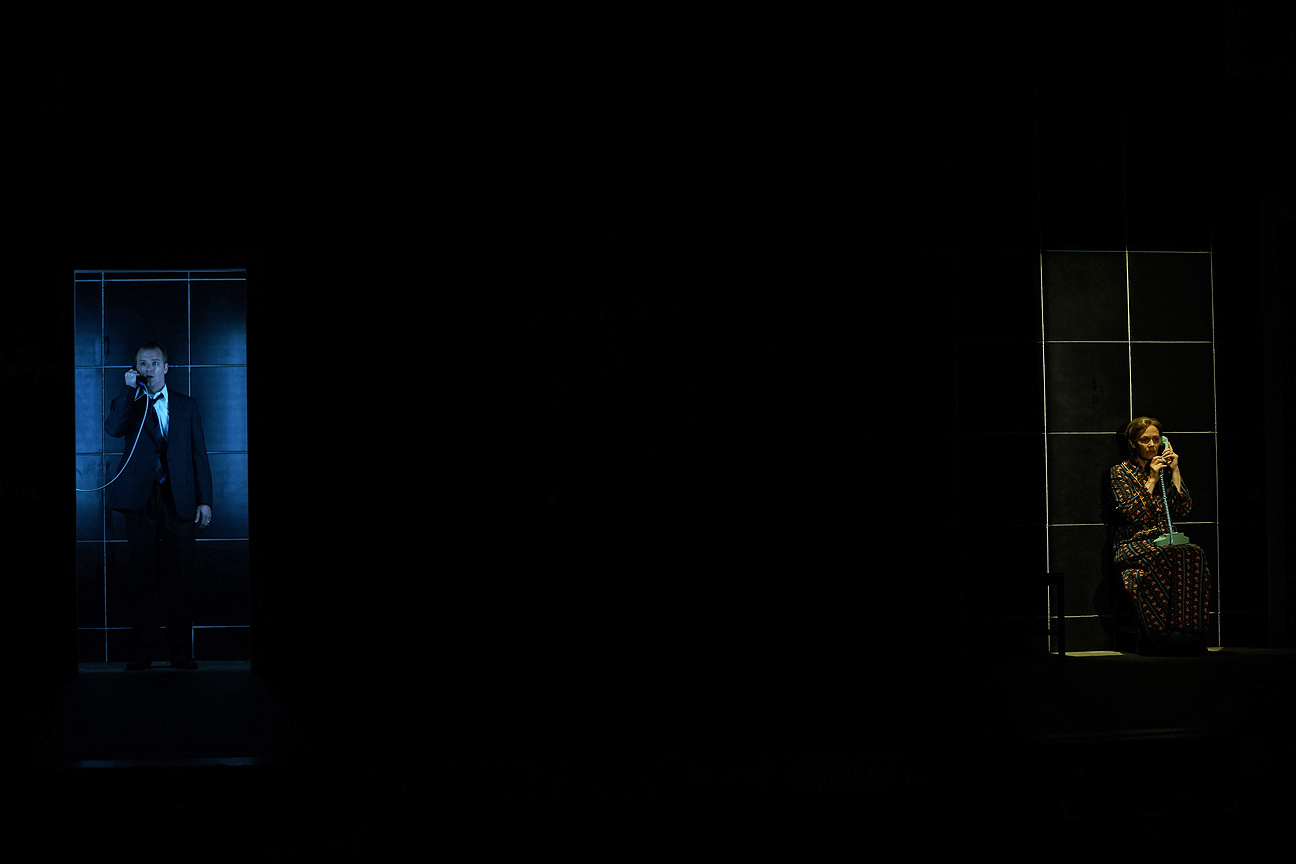AS OWEN WINGRAVE IN OWEN WINGRAVE WITH THE LITTLE OPERA THEATER OF NEW YORK:
“The cast, especially Weyandt as Owen, Klein as Coyle and Curran as Lechmere, were excellent.”
– Patricia Contino, stagebiz.com, 5/13/19.
As Herbert Kitchener in The Nubian Word for Flowers with the International Contemporary Ensemble:
“Kitchener (the clear, evocative Michael Weyandt), in some state between death and life, ends up on a dreamlike version of the Nile River island that would later bear his name.”
– Zachary Woolfe, The New York Times, December 1 2017.
As Joe Pitt in Angels in America with New York City Opera:
“The flexible baritone Michael Weyandt has the requisite clean- cut good looks for the closeted Republican Mormon Joseph Pitt, and he showed a remarkable emotional range in the challenging role. As Harper, Joe’s Valium-addicted wife, Sarah Beckman-Turner revealed a rounded, focused soprano and managed to convey Harper’s tenuous grip on reality without playing crazy. Weyandt and Beckman-Turner made Joe and Harper compelling in their failure to connect.”
– Joshua Rosenblum, Opera News, June 2017.
“The Mormon couple inspired more empathy than judgment with Michael Weyandt managing to be both charismatic and hapless, and Sarah Beckham-Turner steering clear of operatic-madness cliches as her Valium gobbling character hallucinates her way around the world.”
– David Patrick Stearns, Operavore, www.wqxr.org, accessed June 13, 2017.
“Michael Weyandt channeled deep pathos as Joseph Pitt, struggling to reconcile his sexuality with the religious values that have guided his entire life.”
– Eric C. Simpson, newyorkclassicalreview.com, accessed June 11, 2017.
“The whole cast — including Sarah Beckham-Turner, Sarah Castle, Aaron Blake, Mathew Reese and Michael Weyandt — displays knowing individual power amid ensemble virtue.”
– Martin Bernheimer, Financial Times, June 13, 2017.
In Eight Songs for a Mad King with the Talea Ensemble at the University of Chicago:
“Soloist Michael Weyandt delivered a riveting tour de force performance. Whether taking selfies with his cell phone–later smashing it to pieces–confronting Talea musicians in his crazed rants, or screaming in violent desperation, Weyandt painted the king’s unhinged fury with alarming manic intensity. Yet the young baritone also made the king a sympathetic and pitiable figure, taking nostalgic solace in happier times and, in his pleading whispers, attempting to make sense of his declining mental state.”
– Lawrence A. Johnson, chicagoclassicalreview.com, accessed December 4, 2016.
“Peter Maxwell Davies’ ‘Eight Songs for a Mad King’ (1969) veered into the expressionistic and grotesque as it explored the lonely derangement of George III by taking off from tunes played by a mechanical organ owned by the regent. The extraordinary demands put on the baritone soloist were managed seemingly without effort by Michael Weyandt, and the six players achieved a rare, hard-edged wistfulness.”
– Alan G. Artner, Chicago Tribune, December 3, 2016.
As Schaunard in La Bohème with Hawaii Opera Theater:
“Michael Weyandt (Schaunard) shone in his Act I caper about poisoning the parrot.”
– Ruth Bingham, Honolulu Star-Advertiser, October 16, 2016.
In American Lyric Theater’s February 2016 showcase at National Sawdust:
“And baritone Michael Weyandt dramatically performed his dynamic and frequently bombastic aria to his wife, God and the ocean, ‘A Lover’s Grave’…. Albertson sung, cleanly and capably, his robust opening aria, “Lo, ’tis a somber night…,” which went right into “Cold, so cold,” an intriguingly dark-sounding scene with a dramatic performance to match by Weyandt, and a complementary comically morbid turn from Gigliotti…. But there was also something hurt and haunted underneath, and it turned musically and emotionally darker, especially in the quartet “The Fotoplastikon,” in which Albertson and Weyandt joined the women in sharply feeling the music’s progression of emotions.”
– Henry Stewart, Opera News, May 2016
A second aria, the piece’s Mortuary Scene, “Cold, so cold in here” featured Michael Weyandt as the protagonist, Victor, subtly using his sweet lyric baritone…. [on an excerpt from Missy Mazzoli’s Breaking the Waves] Baritone Weyandt’s smooth instrument did well with Jan’s poignant aria, “A Lover’s Grave.”
– Richard Sasanow, Broadwayworld.com, February 16, 2016.
As Mrs. Pig in Shostakovich’s The Tale of the Silly Baby Mouse with On Site Opera:
“Now and then you witness a debut so happy and so rich with potential that you can’t wait to share the news…. the supple baritone Michael Weyandt was a compassionate Mrs. Pig.”
– Steve Smith, The New York Times, June 25, 2012.
As Fernando in Handel’s Almira with operamission:
“The soprano Christy Lombardozzi brought a rich, lush voice and impetuosity to the role of the conflicted Almira, who secretly yearns for Fernando, movingly performed here by the virile, ardent baritone Michael Weyandt.”
– Anthony Tommasini, The New York Times, May 30, 2012.
“As his handsome master Fernando, the Queen’s lovelorn secretary who is always being discovered in deceptively compromising situations, Michael Weyandt brought a lovely virile baritone to a role originally written for a low tenor, a casting decision which paid off as his voice effectively contrasted with the two tenors and two basses.”
– Christopher Corwin, Parterre Box, www.parterre.com, accessed May 29, 2012.
As Brother in Weill’s The Seven Deadly Sins with the Castleton Festival Opera:
“Each of the singers seemed to have a gift for interpreting the varying moods of Weill’s cabaret- style score. Particular highlights in this production include the family’s male quartet members slipping easily into ‘Gluttony’s’ surprising barbershop quartet—perhaps a first in the world of opera….”
– Terry Ponick, The Washington Times, July 11, 2011.
On his performance in the 2011 George London Foundation competition:
“I was impressed with…baritone Michael Weyandt, who showed good sense of propulsion, line and breath control in the Queen Mab aria, from Roméo et Juliette.”
– Brian Kellow, Opera News, May 2011.
As Junius in The Rape of Lucretia with the Castleton Festival Opera:
“Michael Weyandt did a muscular turn as the ambitious Junius….”
– Joshua Kosman, San Francisco Chronicle, March 26, 2011.
“Michael Rice was strong as Collatinus, as was Michael Weyandt as Junius.”
– The Opera Tattler blog, www.operatattler.com, accessed March 27, 2011.
